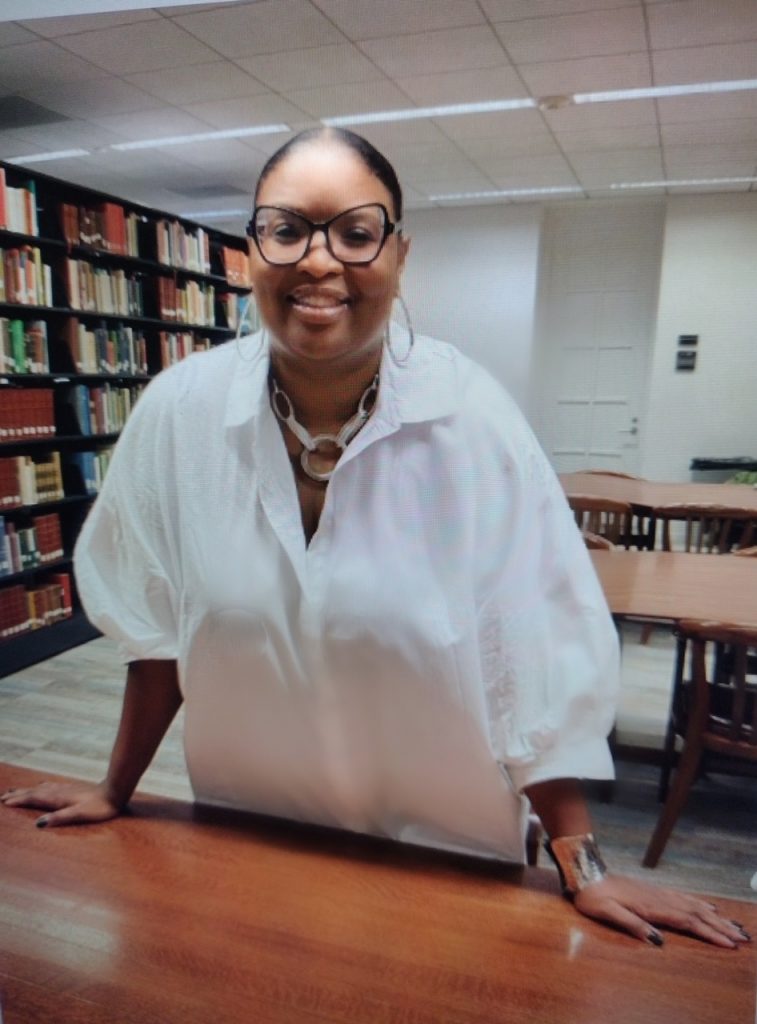 Le Datta Grimes has a passion for telling stories. That passion is what drew her to journalism for the first part of her career and is what ultimately brought her to Clemson Libraries as oral historian.
Le Datta Grimes has a passion for telling stories. That passion is what drew her to journalism for the first part of her career and is what ultimately brought her to Clemson Libraries as oral historian.
Originally from Chattanooga, Tenn., Grimes was the first in her family to graduate from college. She earned a bachelor’s in communications from Middle Tennessee State University and worked as a journalist and features writer for various newspapers and magazines for about 20 years before going back to school to earn a master’s degree and Ph.D. in history, both from the University of Kentucky.
Grimes’ emphasis in her graduate education was on Black communities, education, activism and uplift in the 19th and 20th centuries, with a specific concentration on Rosenwald Schools. Rosenwald Schools were built between 1912 and 1932 in the South for Black people in an effort led by famed educator Booker T. Washington and partially funded by Sears and Roebuck President Julius Rosenwald. While popular narratives credit Rosenwald for funding and building these schools, Grimes’ research looks at the untold stories of the fundraising, labor and other efforts by Black people that truly made these schools a reality. Grimes says her work is largely inspired by her own family.
“I come from a long line of incredibly strong Black women, as well as men. I think about my great-grandmother, who lived to be 99 — she picked cotton the first part of her life and was a custodian for the rest of her life. I think about my grandmother, who also picked cotton in Alabama and became a custodian. They were just regular, everyday people who got up every morning and went to work,” Grimes said. “Same for my mom and dad — my dad was a welder and my mom was a secretary. Their victory was getting up every day, going to work, making the sacrifices that everyday people make — and providing for the people they love. Nobody will likely interview them or talk to them to learn their stories. People like them, their voices get lost in history, so that is what has drawn me to work in oral history.”
Grimes said history is often written “from the top down, instead of from the ground up,” so that the stories of regular, working-class people are not often told.
“History tends to favor the elite and powerful, so you lose all those other voices. I wanted to gather those voices, so I started doing oral history,” she said. “Those voices need to be added to the historical record. Common, everyday people sometimes do extraordinary things, but a lot of times, they’re just doing the best they know how to do. Yet they are also witnesses to history.”
Grimes, who started at Clemson in August 2022, said she is intrigued by the work being done here to preserve and share South Carolina’s and the Clemson area’s Civil Rights history, and she is excited to be a part of telling Clemson’s story.
She hopes to establish a studio to record oral histories of Clemson alumni and members of the local community. She would also like to form partnerships with the community and provide more people with the education and resources they need to capture oral histories from people in their lives.
“Oral history levels the playing field. People like myself can’t be the only ones coming up with the questions and interviewing people,” Grimes said. “I want to provide training and equip students and others so they can record oral histories. I want everybody to know they can be a part of this work.”
Grimes is currently working on turning her dissertation on Rosenwald Schools into a book, and she is the co-producer and co-writer of the documentary “Invented Before You Were Born,” which tells the story of the Bibb freedmen, a group of Black enslaved people who were emancipated by the will of Richard Bibb, and their descendants. The film was recently screened in Chicago as part of a Martin Luther King Day celebration and at the Clemson Area African American Museum.

